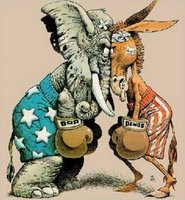on fiduciary responsibility in politics
The NPR show Marketplace did an interesting (but brief) story last Thurs about the recent elections in the US and their impact on the stock market. I found it very interesting. Of course there was the general up or down swing based on how "the market" felt about the way the elections went. But what was really interesting to me was the impact of the change in power on certain companies and industries stock prices. Companies that are traditionally associated with being on the 'good side' of the Republican Party (health care, military, oil, etc) all took a dive, while those associated with Democratic party agendas (alternative fuel, biotech, etc) rose on the election news.
Of course there was the general up or down swing based on how "the market" felt about the way the elections went. But what was really interesting to me was the impact of the change in power on certain companies and industries stock prices. Companies that are traditionally associated with being on the 'good side' of the Republican Party (health care, military, oil, etc) all took a dive, while those associated with Democratic party agendas (alternative fuel, biotech, etc) rose on the election news.
Now, it's pretty easy to just say "that makes sense" and move on. If the Democrats follow through on campaign promises, they will probably push for lower prescription drug prices and cutting our involvement in Iraq. So it makes sense that companies that thrive on those factors would expect to take a cut in profits, and thus their stock prices take a hit.
However, think this through one step further.
It is common news to hear of a company laying off workers, making drastic changes in corporate policy, or buying out other companies, just because "The Street" wants them to. It is often not so much about what is best for the company in the long-term (or even short-term), as much as it is what those in charge think Wall Street investors want them to do. So they often do it just for the kick in stock price. This is part of the system. CEOs and board members first and primary responsibility is not to employees, customers, or the betterment of mankind. Their primary responsibilities and duties are to the shareholders of the company. The owners. It's called their fiduciary responsibility.
This is part of the system. CEOs and board members first and primary responsibility is not to employees, customers, or the betterment of mankind. Their primary responsibilities and duties are to the shareholders of the company. The owners. It's called their fiduciary responsibility.
If i am the head of a major corporation, i am (hopefully) not an idiot. I read the news, i know what Wall Street thinks about my company and my industry. And i am doing everything in my power to keep the stock price of my company as high as it can possibly be. In our cold blooded American "free" enterprise system, no matter what the CEOs personal beliefs or convictions, no matter who their friends or enemies are, they should be doing everything they can to impact every possible thing that could impact the price of their stock.
So, if the elections impact stock prices, why wouldn't we expect corporations to try to influence elections?
Why do people react with such disdain when a company involved in stem-cell research makes a large donation to Democrats? Why all the shock and disappointment when the pharmaceutical industry is a huge sponsor of the Republicans? If you try to figure out how this got started, it comes down to a chicken-or-the-egg problem. Do we associate health care companies with Republicans because the health care companies decided they would try to buy off the Republicans? Or is it because their agenda matches that of the Republicans? Or was it some arbitrary association that is now reinforced by the system?
If you try to figure out how this got started, it comes down to a chicken-or-the-egg problem. Do we associate health care companies with Republicans because the health care companies decided they would try to buy off the Republicans? Or is it because their agenda matches that of the Republicans? Or was it some arbitrary association that is now reinforced by the system?
I am not so naive as to believe that the companies are trapped against their will and didn't sign up for this whole show. Their current level of involvement in the political system was and is their choice. I just think it's odd that many people act as surprised as they do when faced with political "corruption" in the form of corporations paying to help see a politician elected.



 Digg This!
Digg This!
No comments:
Post a Comment